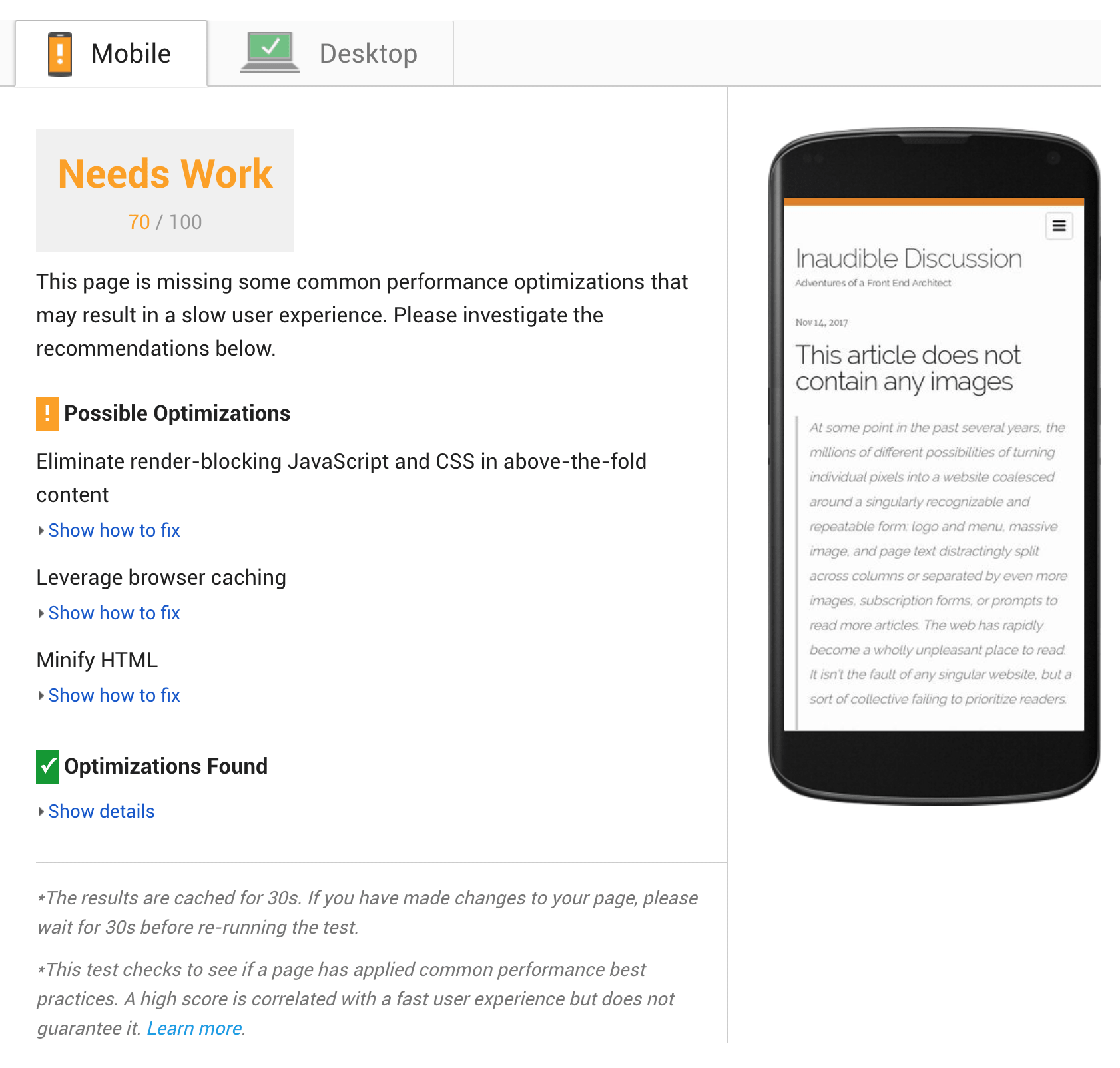Google PageSpeed Insight lacks commonsense and is becoming irrelevant
This has been something that has irked me for some time now, and I haven't unloaded a good rant on development in some time. Yesterday I wrote about image bloat and decided to add a few negligible optimizations that I've meant to do for a year or two that resulted in about 8-10k reduction per page. After I enabled HTML and CSS minification on my blog, I skated over to PageSpeed, plugged my URL in and frowned. My newly optimized blog post scored a whopping 70/100. My page is 84.5k (or 68.5K without google analytics).

For reference, wired.com scores 73 out of 100 on mobile with the total page loading 5.1 megabytes and Newsweek.com scores a god damned 84 out of 100 and loads 7.1 MB!. This is utter and complete stupid bullshit.
Here in lies the rub: While Google PageSpeed always had a "reach for the stars" mentality but is woefully in out of touch when judging a page's real world performance. A 300k page, even poorly optimized one is going to beat the 3 MB page (average page size of major websites) in load times. In the era of a smart phone data plans: a customer could load 30 poorly optimized pages for one bloated highly optimized 3 MB beast of a page. It's telling that Google stopped developing its "PageSpeed" tool into Chrome and has since relegated to its annoying web-only interface. It's become a tool that would be SEO gurus/experts/snakeoil salespersons use when hired by clients use to hold over developers and provide "recommendations" in CMS websites that do not provide easy vectors for the more avant-garde optimizations like HTML minification (which incidentally tends to save less data than CSS/JS optimization, or less than using HTTP compression).
PageSpeed says nothing about image formats beyond image scaling (and seems to be mostly tone deaf) to responsive images in reasonable margins of error. You can plug in a 500k PNG that could be served by a 40k JPEG image only to have PageSpeed score not even budge. It won't even blink if you're making an effort to support avant-garde image formats like WebP and JPEG2000 to provide more bang per Kilobyte.
PageSpeed is also frighteningly javascript unaware. "Oh, you have a BitCoin mining javascript file? Is it minified? Is it uglified? Is it GZ compressed? Yes? THUMBS UP BUDDY! Also, good job on the 'Your flash is out of date malware javascript pop up.'" If you're tricky, write in an obfuscated javascript append script to say, the 460k uncompressed D3 library and Google PageSpeed won't even bother to check.
Other poor detects revolve around iframes to popular services like YouTube / Vimeo / SoundCloud / CodePen and suggest optimizations based on the iframe content, anathema to the entire principal of CORS.
There's also zero comment on total requests on the page other than suggesting to concatenate files and create image maps, it'll ding you hard for having multiple CSS imports for Google Fonts, but doesn't give a royal damn if you're making several hundred HTTP requests. (Note: most browsers are limited to 6 requests at a time per domain, and usually cap out at around 17 simultaneous. Each request must filled or 403/404ed to open another request. This says nothing about the limitations of the server either for max clients, more requests = more server stress.)
Want to measure rendering performance? Forget it. There's no discernable metric about time to paint, or continous painting. Feel free to go nuts with CSS filters and bring a lesser device to its knees, PageSpeed doesn't care as long as your CSS is minified.
Lastly, it can be wildly inaccuraate. My page is minified HTML and yet PageSpeed's wonderful insight is that I should minify my HTML. Wat. View source on any page on this blog if you don't believe me...
There's probably a reason why I didn't notice that PageSpeed Insights had been removed in Chrome, as its mostly useless to a savvy front end dev beyond a sanity check. It can be taken that Google Pagespeed isn't a metric of your site vs other websites but rather, you vs yourself. Even that rational falls apart as it doesn't give guidance on recommendations too many factors nor does it put any judgement on data use. Google clearly cares about data use, as its questionable Accelerated Mobile Mobile project (AMP) exists. PageSpeed Insights was a tool of genius, but now it feels like it's past its prime and/or in need of some TLC. Really, what I'm asking for is perspective, and Google Pagespeed Insights doesn't have it.